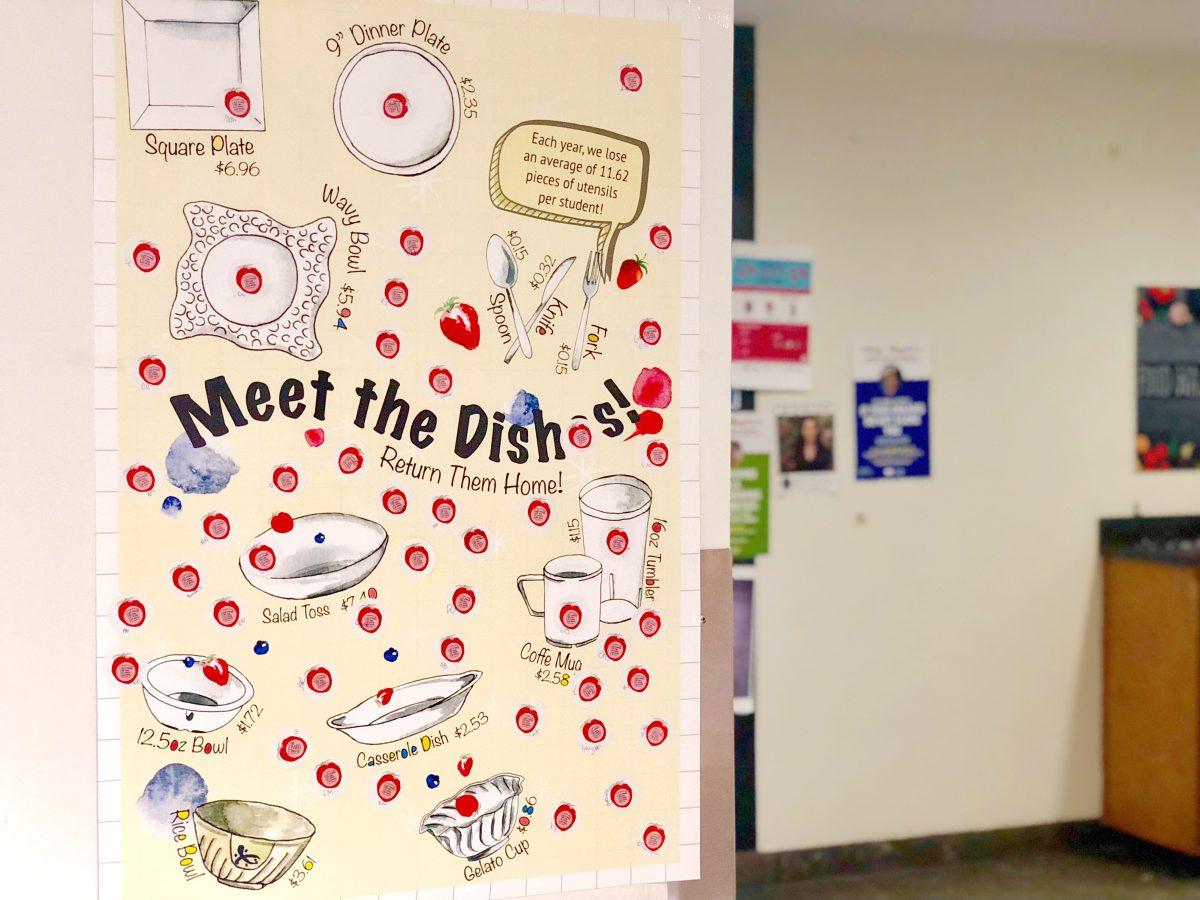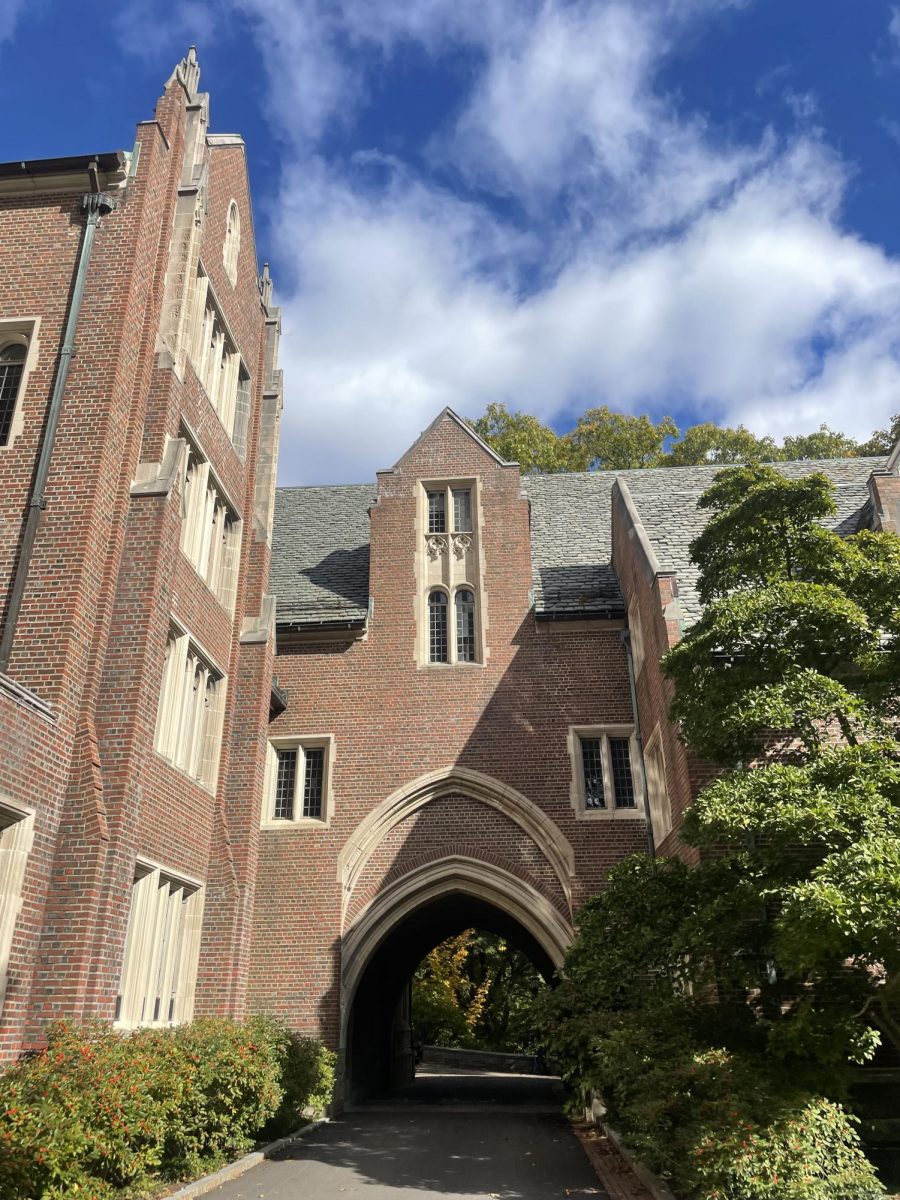In the fall 2017 semester, Nicole Zhao ’20 and Yuxi Xia ’20 initiated a campaign to tackle the problem of wasted resources in campus dining halls. The two students work as student sustainability interns with AVI Foodsystems, the hospitality provider of on-campus dining that runs Wellesley Fresh. Last semester, in response to concerns expressed by both students and Wellesley Fresh employees, Zhao and Xia came up with a plan to bring attention to “dissues,” or “dish issues,” on Wellesley’s campus.
The primary concern they sought to address was the loss of dining ware resulting from students removing dishes from the dining halls and then failing to return them. According to Zhao, Keith Tyger, the executive chef at Wellesley Fresh, revealed that the company spent over $260,000 in the course of the last seven years on replacing dining hall dishware. Students as well as staff have been concerned about this waste. At a brainstorming forum held as part of the Student Sustainability Challenge, an initiative hosted by the College’s Sustainability Committee, dissues was one of the top three responses listed by students when asked to name an area in which the College could change behaviors to better align itself with sustainable on-campus practices. In response to these concerns, Zhao and Xia decided to take action.
Over the course of the semester, the sustainability interns utilized a number of methods to raise awareness of this issue, most notably by setting up tables in dining halls with informative and creative displays. The interns worked in collaboration with Keith Tyger and Resident Director Cherie Tyger to create the behavior-change campaign. On a few occasions, the interns were equipped with bowls of fresh strawberries, using the fruit to better illustrate the costs of dishware waste, noting that the money spent on dish replacement could be better spent on fresh produce. During these interactive sessions, which were held during dining hall meal times, students who accepted berries were asked to pledge to take individual responsibility in returning dishware promptly to the dining halls. Over the course of the semester and 10 hours of campaigning, Zhao and Xia reached over 500 students.
The campaign has grown in size and has won the support of the College’s Office of Sustainability. Dorothea Von Herder, the coordinator of campus sustainability programs, was so impressed by the initiative that she asked interns and volunteers from her office to get involved. Many of them, including House Council Eco Reps, now assist in running campaign tables in the dining halls and are also integral to other aspects of the campaign, such as social media efforts.
Ultimately, Xia believes it is up to students to take individual responsibility and to support one another in following sustainable practices.
“Personally, I have always seen dishes laying around in kitchenettes, and I’d always take them back to the dining hall when I can, and I know others who do the same and are frustrated by dissues”, she said. “We wanted to raise awareness on the problem and reduce loss that could totally be avoided.”
Other students, such as Grace Wong ’21, expressed frustration regarding the behavior she has witnessed relating to Wellesley Fresh dishware.
“I lived in Stone-Davis first semester, and on my hall some people were throwing dishes into our bathroom trash can or leaving them in the stairwell. I was absolutely appalled—these aren’t disposable dishes! We’re supposed to return them to the dining hall, not just throw them away. So on multiple occasions I would fish the dishes out of the trash can,” Wong said.
Zhao offered her suggestions for individuals, like Wong, who would like to get involved and play a role in combating this issue. For those interested in joining the campaign efforts, the Sustainability Office invites volunteers to help manage table displays in dining halls. Zhao also suggested taking photos of dishes in residential hall common areas to post on social media or raising the issue for discussion during House Council meetings.
“But most importantly, we should all be doing our parts to encourage each other and remind ourselves to bring dishes back in a timely manner,” Zhao added.
Dissues is only one of several efforts on campus to promote sustainability at Wellesley. According to the school’s website, the 2017-18 academic year has been declared the College’s “Year of Sustainability,” the purpose of which is “to engage the campus community in thoughtful discussions about what sustainability means for us today, and to promote positive behavioral changes and intellectual discourse that will endure beyond the themed year.” As part of the “Year of Sustainability,” the College has invited environmental activist and former Vice President Al Gore to deliver the annual Wilson Lecture on April 25.
For now, Zhao, Xia and other sustainability interns remain committed to eliminating the $40,000 sum that is spent each year to replace missing dishware from the dining halls and making Wellesley a more environmentally-conscious environment. Their campaign has already prompted other students to get involved. “Last semester, Yuxi and I were the only two students going to every dining hall one at a time during the dissues campaign week to run our strawberry and sticker poster program,” Zhao recalls. “Now, there are campaign tables simultaneously at every dining hall, and there are more students who are responsible for running the campaign and manning the tables.” Zhao and Xia hope that their campaign has inspired a lasting discussion on campus and can eliminate an issue that can easily be resolved.






